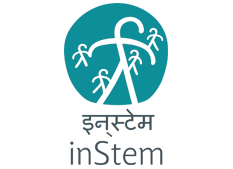Mandate
inStem’s research efforts are directed at cell differentiation and tissue regeneration with disease relevance. It has primarily focused on accelerating advances in stem cell biology and regeneration in the context of brain, blood and cardiac disorders, skin diseases, as well as manipulation of stem cells for iPSC-based disease and tissue modeling.
Campus
inStem is located in about 20 acres of space leased out by the Gandhi Krishi Vigyan Kendra, Govt of Karnataka (rent). The translational unit CSCR is located on the campus at Christian Medical College Vellore.
Research Focus
Research at inStem is organized in the following interdisciplinary themes: i) Inflammation and Tissue Homeostasis, ii) Cardiovascular Disorders and Cardiac Disease, iii) Brain Disorders, iv) Cell and Gene Therapy at CSCR, Vellore, v) Metabolic Control of Cell Fate, and vi) Integrative Chemical Biology.
Human Resource
The institute has 22 scientists and around 200 research fellows engaged in high-caliber research, supported by 8 technical and 16 administrative staff.
Key Scientific Achievements
Major achievements in the last 5 years (2017-22) are as follows:
Publications
PhD Degrees Awarded
Postdocs and research fellows
Patents awarded
Technologies commercialized
- inStem hosts several National laboratories, such as the DBT-funded Multiscale program in Biology, which supports the National Cryo-EM Facility, which began activities in 2018 in partnership with the National Centre for Biological Sciences, TIFR. The facility has a 300 kV Transmission Electron Microscope (TEM). This is the first of its kind in India. The facility has trained more than 40 users and supported elven publications from laboratories nationwide. All users are provided access to complete wet laboratory support on-site.
- inStem is a partner and coordinator of the Indo-Japan Collaborative Program on "Accelerating the application of Stem cell technology in Human Diseases (ASHD)," which is directed at capacity building in Stem Cell technology through an Indo-Japan partnership. ASHD is an initiative to apply the power of modern stem cell technology to develop solutions for human blood and brain disorders, important public health problems in India. This collaborative initiative is between the Indian research institutes - inStem, CSCR, NCBS, NIMHANS, CMC - and the Centre for iPSC Research and Application (CiRA), Kyoto, Japan. This is also a foundational program for a Stem Cell Core (including an iPSC Repository) at inStem and a Haplobank – a collection of HLA matched homozygous individuals -of cGMP grade iPSC at CSCR.
- inStem co-hosts the DBT-supported National Mouse Research Resource (NaMoR) Facility. The Facility has established and manages a state-of-the-art rodent facility including transgenic and knockout mouse models of human disease. This is the only Indian academic facility that has begun to provide services such as cryopreservation, cryo-recovery, in vitro fertilization, strain re-derivation, micro-injection, and embryo transfer services to other institutes across India and has a central nationwide stock database, a mouse cryobank, and repository.
- The Program in Chemical Biology & Therapeutics. described a new approach to selectively interrupt intracellular signalling pathways initiated by protein kinases using drugs that block the molecular recognition of phosphorylated proteins.
- Development of a nucleophilic polymer, which is formulated into a topical gel, can be applied on the skin before spraying of pesticides. This gel can deactivate pesticides on the skin through nucleophilic-mediated hydrolysis, thereby preventing pesticide-induced toxicity and lethality.
- The faculty and early career researchers at inStem have received numerous awards and recognition for their scientific contributions, such as the EMBO Global Investigator Award, Hargobind Khorana Innovative Young Biotechnologist Award, DBT-Wellcome Trust India Alliance Fellowships, Ramalingaswami Fellowship, Gandhian Young Technological Innovation Award, MK Bhan-Young Researcher Fellowship, Grand Challenges Explorations (GCE) Award etc.
- The institute regularly organizes outreach and public engagement events such as its Open Science Days for visits by school and college students, participation in India International Science Festival, Global Bio India, regular Science Setu Webinars, Public talks by faculty, Science Cafes, theatre performances, etc.
